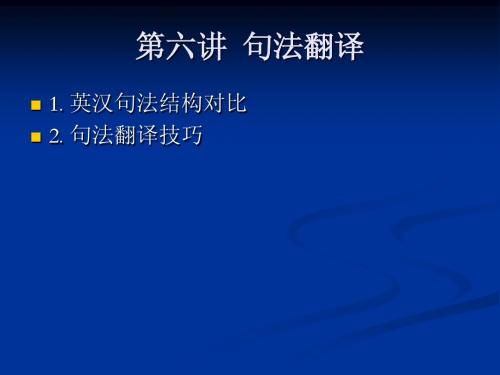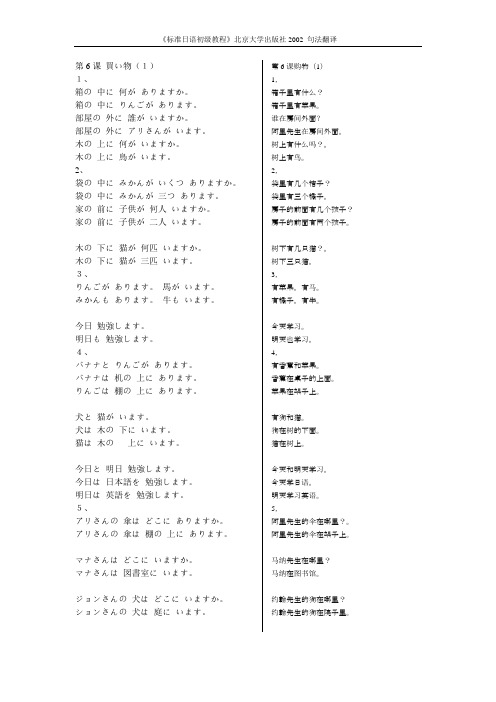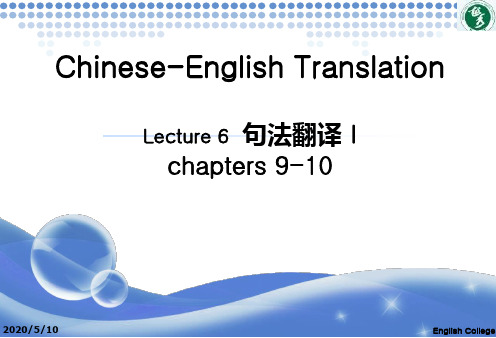第六讲 句法翻译
汉译英:句子的翻译说课讲解

3 增补主语 :两个原则必须遵循,一是要推敲语境;二是 要考虑英语语法习惯和行文的需要。
持续下了几天雨,郊区的道路境况极坏。
The roads in the suburbs are very bad。owing to the continual rainy days.
四、翻译中的主与次
(二)汉语流水句的翻译 流水句是一种无关联词的复句,其特点是“在非终句段出现句
终语调,语义联系比较松散,句段之间难以补上关联词”(《中译 英技巧文集》第282页)。这些句子有的着重动词,即多个动词连用, 有的着重名词,即以名词为重点。例如: 紫鹃答应着,忙出来换了一个痰盆儿,将手里的这个盆儿放在 桌子上,开了套间门出来,仍旧带上门,放下撒花软帘,出来叫醒 雪雁。(《红楼梦》) 这是比较典型的流水句,事情逐一交代,层层铺开,如何英译 呢?请比较下述两种译文: 译文I:Zijuan was answering and hurried out。to change a spittoon and put the spittoon in her hand on the table and opened the door of inner room to go out,still closed it,let down the flowered portiere and went to wake Xueyan. 译文Ⅱ:Zijuan,assenting,hurried out to fetch a clean spittoon,placing the used one on the table in the outer room.Having closed the door behind her,she let down the soft flower portiere before going to wake Xueyan.(摘自杨自 俭“小议汉语几类句子的英译”)
翻译技巧:句法翻

二、译成汉语无主句
• Measures have been taken to prevent the epidemic from spreading quickly. • 已经采取了措施来防止这种流行病迅速蔓延。 • Water can be shown as containing impurities. • 可以证明,水含有杂质。 • The unpleasant noise must be immediately put an end. • 必须全部停止这种讨厌的噪声。
• I finished my task just now. • My task was finished just now (by me).
• The farmers plant many apple trees there. • Many apple trees are planted there (by the farmers).
四、译成汉语被动句
• 使用“被、受、遭、让、给、由、把、得到、受到、加以、得以、 为...所、由...来”等等。 • The minister was found to have appropriated government money. • 部长被发现挪用公款。 • He had been fired for refusing to obey orders from the head office. • 他因拒绝接受总公司的命令而被解雇了。 • The schoolboy was knocked down by a minibus when crossing the street. • 那名男生在穿过街道时让一辆小公共汽车撞倒了。 • He was praised by his teacher. • 他得到了老师的表扬。 • Problems should be resolved in good time. • 问题应及时加以解决。
英语语法_第五章6_长句的译法

Very hesitatingly I selected a tube of blue paint, and (with infinite precaution) made a mark (about as big as a bean on the snow-white field.) 我迟疑不决地选了一管蓝色颜料,然后非常小 心翼翼地在画布雪白的底色上点了豆子般大小 的一点。
对于各项计划的评估,不要看其令人们高兴的程度, 使人们满意的程度,而要看其引起的不满情绪属于 什么性质。
长句翻译的操作方法:
1、理顺原句内部关系,理出句中包含的各 语义点
2、将整理出的各语义点按汉语表达习惯重 新排列。 3、依照重新排列的语义点顺序用汉语逐点 表达
课堂翻பைடு நூலகம்练习:
1. I wondered how she would feel if she learned that the Negro before whom she had behaved in such an unladylike manner was habitually a white man.
Sony’s $3.4 billion deal for Columbia Pictures marks Japan’s biggest U.S. takeover ever -- and adds to fears (that it is "buying America" and taking an invincible lead in trade and technology). 索尼公司用34亿美元买下了哥抡比亚电影 公司,这是迄今为止日本对美国一笔金额 最大的收购,而且使人们更加担心日本正 在“收购美国”,正在贸易和技术方面不 可阻挡地发挥着主导作用。
第六讲非谓语动词

第六讲非谓语动词一、总说:1.概念:不能在句中单独做谓语的动词形式,在句中起名词、形容词或副词作用。
2. 时态和语态:非谓语的时态和语态是相对的,要选择正确的非谓语形式,必须找准参照物,牢记一句口诀:___________________________________。
3. 分类: to do,v-ing和v-ed。
4. 否认形式:在非谓语标志性的单词前加not,即在to, v-ing或v-ed前面加not。
二、不定式:㈠不定式的时态:参照物是_____________,须比拟二者的_______关系。
①一般式to do:表示的动作和谓语动词动作_________或发生在谓语动词动作_______。
. He decided to go with us.I hope to see you next week.②进展式to be doing: 表示的动作和谓语动词动作__________。
. The boy pretended to be working hard.He seems to be reading in his room.③完成式to have done: 表示的动作发生在谓语动词动作_______。
. I’m sorry to have interrupted you.比拟该句和I’m sorry to interrupt you.的区别:㈡不定式的语态:参照物是___________,须比拟二者的________关系。
. a. The library __________ next year is very beautiful. (build)b. The room seems ___________________ already. (tidy up)注:①在easy, hard, difficult, pleasant, interesting等形容词后的不定式由于往往能补充出for sb.〔即动作的发出者〕, 所以通常使用主动形式:. a. The water is not fit to drink.b. The chair is comfortable to sit on.c. The problem is difficult to deal with.②某些动词的不定式作表语,需用主动形式表被动含义:e.g. a. Parents are to blame if their children do not have good manners.b. The house is to let.㈢不定式的句法功能:动词不定式除了不能单独作谓语外,几乎能充当句子中所有的句子成分。
句法翻译法

句法翻译法第一节名词性从句的翻译一、主语从句1、以what, whatever, whether, when, where, how, why等引导的主语从句,在翻译的时候,一般可以按照英语原文顺序来翻译。
(举例)What he told me was only liesWhen we can begin the journey is still a question.2、用it作形式主语的主语从句,可以把主语从句放到汉语句子的最前面翻译。
为了强调,it一般可以译出来, 翻译成“这”;如果不需要强调,it也可以不译出来, (但一定要采取颠倒语序倒着翻译!!!)(举例)It doesn’t make much difference whether he attends the meeting or not.It seemed unbelievable that the pilot could have survived the crash.题二、宾语从句1.用that, what, how, when, which, why, whether, if等引导的宾语从句,在翻译成汉语的时候,一般不需要改变它在原句中的顺序。
(举例)I told him that because of the last condition, I’d have to turn it down.Can you hear what I say?I don’t know that he swam across the river.I don’t know how he swam across the river.He has informed me when they are to discuss my proposal.2.用it作形式宾语的句子,在翻译的时候,that所引导的宾语从句一般可以按英语原文的顺序来翻译;it有时候可以不用翻译。
第六讲:句法翻译

1. 英汉句法结构对比 2. 句法翻译技巧
英汉句法结构对比
英汉句子基本结构: 主语+谓语+宾语 虽然如此,但英汉句子结构在形式上有很多 差异,主要体现在句序和句子结构等方面。
句序的差异
A. 修饰语位置差异 英语的修饰语,如定语等,既可以置于被修饰语之前,又可 以置于其后。但若修饰语是短语或分句,如定语从句等,则 一般置于被修饰成分之后,称为后置。而汉语的修饰语,无 论是词,短语还是句子,一般都放在被修饰成分之前,称为 前置。如: 1. The son whom he had turned out had gone to a distant land, and his daughter was dead; so that there was no one left to help the old people. 被他赶走的儿子已远走他乡,女儿也去世了,所以没人能帮 助这两位老人了。
3. It suited their master to have them in his service, since the old people had been in authority themselves, and so knew how to do things. 因为老夫妇曾经是主人,知道怎么干活,所以穆罕
2. Then the guest called to the old woman who was seated behind the curtain: “ tell me, the old woman, what you think concerning the former happiness and your present misery.” 于是这位客人就大声询问坐在帘子后面的老
标准日语初级教程句法翻译第06课第06课

《标准日语初级教程》北京大学出版社 2002 句法翻译
第 6 课 買い物(1) 1、 箱の 中に 何が ありますか。 箱の 中に りんごが あります。 部屋の 外に 誰が いますか。 部屋の 外に アリさんが います。 木の 上に 何が いますか。 木の 上に 鳥が います。 2、 袋の 中に みかんが いくつ ありますか。 袋の 中に みかんが 三つ あります。 家の 前に 子供が 何人 いますか。 家の 前に 子供が 二人 います。
树下有几只猫?。 树下三只猫。 3, 有苹果。有马。 有橘子。有牛。
今日 勉強します。 明日も 勉強します。 4、 バナナと りんごが あります。 バナナは 机の 上に あります。 りんごは 棚の 上に あります。
今天学习。 明天也学习。 4, 有香蕉和苹果。 香蕉在桌子的上面。 苹果在架子上。
犬と 猫が います。 犬は 木の 下に います。 猫は 木の 上に います。
7, 椅子和桌子之间有什么东西吗? 不,什么都没有。 有谁在铃木先生的旁边吗? 不,谁也没在。 水池对面有什么吗? 不,什么也没有。 在这个百货商店买什么东西吗? 不,什么都没有买。 8, 一支圆珠笔是多少钱?。 圆珠笔是一根三百日元。
ボールペンは 三本 いくらですか。 ボールペンは 三本 九百円です。 9、 それは どんな はなですか。 これは きれいな 花です。 この花は きれい です。 ここは 静かな 部屋です。この 部屋は 静で す。 これは 丈夫な 箱です。 この 箱は 丈夫です。 今日は 暇な 日です。 今日は 暇な。 10、 宿題は 日本語だけですか。 いいえ、日本語だけでは ありません。英語 あ ります。
钱多吗? 没有,一点钱也没有。
7、 椅子と 机の 間に 何か ありますか。 いいえ、何も ありません。 鈴木さんの 横に 誰か いますか。 いいえ、誰もいません。 池の 向こうに 何か いますか。 いいえ、何も いません。 この デパートで 何か 買いますか。 いいえ、何も 買いません。 8、 ボールペンは 一本 いくらですか。 ボールペンは 一本 三百円です。
Lecture 6 句法翻译1

2011-5-4
4
English College
Try to translate the following sentences: 今天食堂吃饺子。
叉子吃不好吃筷子吧。
吃食堂味道不好。
2011-5-4 5 English College
到底 “谁” 吃“谁”?! 这种紊乱的施事(Agent Agent)与受事(Object Object)关系在 Agent Object 英语中简直是离经叛道,却在汉语里显得那么自然。 (今天食堂有 Jiaozi are served in the canteen today. ( 饺子吃) ) Eat with chopsticks if you can’t (do it well) with a fork. ( (用叉子吃不好就用筷子吃吧) ) The food served in the canteen doesn’t taste (在食堂吃的饭菜味道不好) good. ( ) 英语上述各句中的“吃”都隐含有逻辑主语(即施事 者)“人”,而原文句中的主语功能都变成了施事的 方式或场所。 2011-5-4 6 English College
2011-5-4 14 English College
2).问遍千家成行家。 Learn from numerous advisers , and you will become a master.
2011-5-4
15
English College
2.汉语的散点思维 2. 他有个女儿,在北京工作,已经打电话去了,听说明天就能回来。 , , , Version A :His daughter works in Beijing has been called, His and she would come back tomorrow. B:He Version B He has a daughter, working in Peking, who we have given a call and we hear of that she will come back tomorrow. 汉语句子变换了主语,并将其省略。补出主语后句子是这样的: 他有个女儿,(她)在北京工作,(有人)已经打电话去了,( 人们)听说(她)明天就能回来。 可以看出两例的译文基本没有摆脱原文形式的束缚,主语选择不 符合英语表达习惯。 It is heard of that his daughter who works in Beijing will come back tomorrow. 2011-5-4 16 English College
- 1、下载文档前请自行甄别文档内容的完整性,平台不提供额外的编辑、内容补充、找答案等附加服务。
- 2、"仅部分预览"的文档,不可在线预览部分如存在完整性等问题,可反馈申请退款(可完整预览的文档不适用该条件!)。
- 3、如文档侵犯您的权益,请联系客服反馈,我们会尽快为您处理(人工客服工作时间:9:00-18:30)。
我们 ①为顾全大局 ②于同年 ③秋末 ④在第三方的调停下⑤开诚布 在第三方的调停下⑤ 公地⑥多次⑦强烈要求 公地⑥多次⑦强烈要求贵方赔偿我们的一切损失。 要求贵方赔偿我们的一切损失。 ④ With the third party acting as an intermediary, ①to take intermediary, the interest of the whole into account, we ⑦strongly account, demanded ⑤with frankness and sincerity ⑥many times ③ at the end of the autumn ②of the same year that you should compensate all our losses. (汉语原文状语的词序:☆主语 (汉语原文状语的词序:☆主语、①目的状语、②时间状语中的年份、 主语、①目的状语、②时间状语中的年份、 ③时间状语中的季节、④条件状语、⑤方式状语、⑥频度状语、⑦程 度状语、★谓语 度状语、★谓语、◎宾语; 谓语、◎宾语 宾语; 英语译文状语的词序:④条件状语、①目的状语、☆主语 英语译文状语的词序:④条件状语、①目的状语、☆主语、⑦程 主语、⑦程 度状语、★谓语 度状语、★谓语、⑤方式状语、⑥频度状语、③时间状语中的季节、 谓语、⑤方式状语、⑥频度状语、③时间状语中的季节、 ②时间状语中的年份、◎宾语 ②时间状语中的年份、◎宾语) 宾语)
较为复杂的换序译法: He witnessed ①the sixth ②post-war ③ posteconomic crisis ④of serious consequence ⑤that prevailed in various fields ⑥in the USA. 他亲眼目睹了⑥美国 战后①第六次④ USA. 他亲眼目睹了⑥美国②战后①第六次④后 美国② 果严重的⑤波及各领域的③经济危机。 果严重的⑤波及各领域的③经济危机。 (英语原文定语的词序: ①次第定语、 ②时间 定语、 ③本质性定语、★中心词、④判断性定语、 ③本质性定语、★中心词 中心词、④判断性定语、 ⑤陈述性定语、⑥国别定语; 汉语译文定语的词序:⑥国别定语、②时间定 语、①次第定语、④判断性定语、⑤陈述性定语、 ③本质性定语、★中心词 ③本质性定语、★中心词) 中心词)
二、断句译法
1) It is certain that man will eventually solve the riddle of UFO. 人类最后必将解开不明飞行物之谜。// UFO. 人类最后必将解开不明飞行物之谜。 这一点是可以肯定的。(拆开名词从句) 2) Because the young man frequently came to the lady’s house, he was regarded as the lady’ mistress’ mistress’s lover. 这个小伙子经常来到太太的家。因此, 这个小伙子经常来到太太的家。 别人都以为他是这女主人的情人。(拆开状语从句) 3) After the war, his friend Kraemer got him a job as an instructor in an Army training school that paid $ 10,000 a year. 大战结束后,他的朋友克莱摩 介绍他到一所军事训练学校去任教,年薪一万美元 介绍他到一所军事训练学校去任教,年薪一万美元。(拆 年薪一万美元。 开定语从句)
4) 发生了这样的事不是你的错。It’s not your fault 发生了这样的事不是你的错。It’ that this has happened. (×That this has happened. happened is not your fault. 这样翻译过于正规,在 文体上与原文不符。)(主语从句换序) 5) 她每天早上教我们学法语。She teaches us French 每天早上教我们学法语。She every morning. (×She every morning teaches morning. us French.)(状语换序) French.)(状语换序) 6) 一直在一旁观看的小学生们开始鼓起掌来。The 一直在一旁观看的小学生们开始鼓起掌来。The pupils that had been watching started to applaud. (×The always watching pupils started to applaud.)(定语从句换序) applaud.)(定语从句换序)
四、合句译法
1) Darkness fell. // An explosion shook the earth. // It did not shake his will to go to the front. 夜幕 降落时,一声爆炸震动了大地,可 降落时,一声爆炸震动了大地,可并没动摇他上前线的决 心。 2) That day, the President had an interview with her father. // Her father was going to the moon by space shuttle. 那天,总统会见了她的父亲,因为她 那天,总统会见了她的父亲,因为 因为她 的父亲即将乘航天飞机去登月。 3) She is very busy at home. // She has to take care of the children and do the kitchen work. 她在 家很忙,又要看好孩子,又 家很忙,又要看好孩子,又要下厨。
Heat from the sun comes to us by radiation. 太阳通过辐射给我们热量。 Soon there would be no Poland to guarantee! 波兰很快就不复存在了,还需要什么担保呢? 注:原文的意思是“ 注:原文的意思是“很快就没有波兰需要担保 了”,不仅费解而且可能引起误解。译文把原文 拆为两句,并且把感叹句大胆改为疑问句,原意 豁然贯通。
4) 这首歌并不曾继续多久,// 就和笛声共同消失在黑暗 这首歌并不曾继续多久,// 里了。(巴金:《 里了。(巴金:《家》)The singing did not last very long. // Soon, together with the sound of the flute, it faded away in the darkness. (拆开状 语从句) 5) 自己既不肯动,他倒希望虎姑娘快快进屋去,或是命 令他干点什么,// 令他干点什么,// 简直受不了这样的折磨,一种什么也不 像而非常难过的折磨。(老舍:《骆驼祥子》 像而非常难过的折磨。(老舍:《骆驼祥子》)He didn’ didn’t feel like moving, but wished Tigress would hurry back inside, or else give him some orders. // He simply couldn’t stand this strain, which was couldn’ unlike anything he had ever known, and quite unbearable. (拆开状语从句)
第三部分 句法翻译
一、换序译法 二、断句译法 三、转句译法 四、合句译法 五、缩句译法 六、转态译法 七、正反译法
一、换序译法
1) It’s good you're so considerate. 你想得 It’ considerate. 这样周到是很好的。(×这是很好的你想得这样 这样周到是很好的。(×这是很好的你想得这样 周到。)(主语从句换序) 周到。)(主语从句换序) 2) Formerly a worker himself, he was now himself, an engineer. 他过去是工人,现在当了工程师 过去是工人,现在当了工程师 了。(×以前的工人,他是现在一个工程师。) 了。(×以前的工人,他是现在一个工程师。) (同位语换序) 3) On and on Byron talked. (Herman Wouk: The Winds of War) 拜伦滔滔不绝地 War) 拜伦滔滔不绝地 讲述着。(×滔滔不绝地拜伦讲述着。)(状语 讲述着。(×滔滔不绝地拜伦讲述着。)(状语 换序)
As relations between China and Australia develop, the continuing importance of expanding trade will be balanced by the development of close contact over a broad range of political issues. 随着中澳关系的发展,扩大贸易仍将是重要的, 相应地还要在一系列广泛的政治问题上展开密切 的联系。 注:译者恰当地把英语动词balance译成 注:译者恰当地把英语动词balance译成 “相应 地”,同时,把主句译成汉语的并列句。
4) 去年八月那场使七个国家遭受了极大损失的来势凶猛的龙卷风已 去年八月那场使七个国家遭受了极大损失的 使七个国家遭受了极大损失的来势凶猛的龙卷风已 经引起全球科学家的高度重视。The 经引起全球科学家的高度重视。The violent tornado that struck in August last year has aroused great attention among the scientists throughout the world. Seven countries suffered a great loss from the tornado. (定语转句) 5) 冬天,快过阴历年的时候,一个风雪满天的星期日,余永泽从外 冬天, 面抱回了许多好吃的东西。(杨沫:《青春之歌》)It was winter. 面抱回了许多好吃的东西。(杨沫:《青春之歌》 One snowy Sunday not long before the lunar New Year, Yongze came home loaded with parcels. (状语转句) 6) 他像大海捞针一样在茫茫黑夜里寻找金色的梦。He searched 像大海捞针一样在茫茫黑夜里寻找金色的梦。He for his golden dream in the pitch dark of the night. It needle in the ocean. (状语转句)
